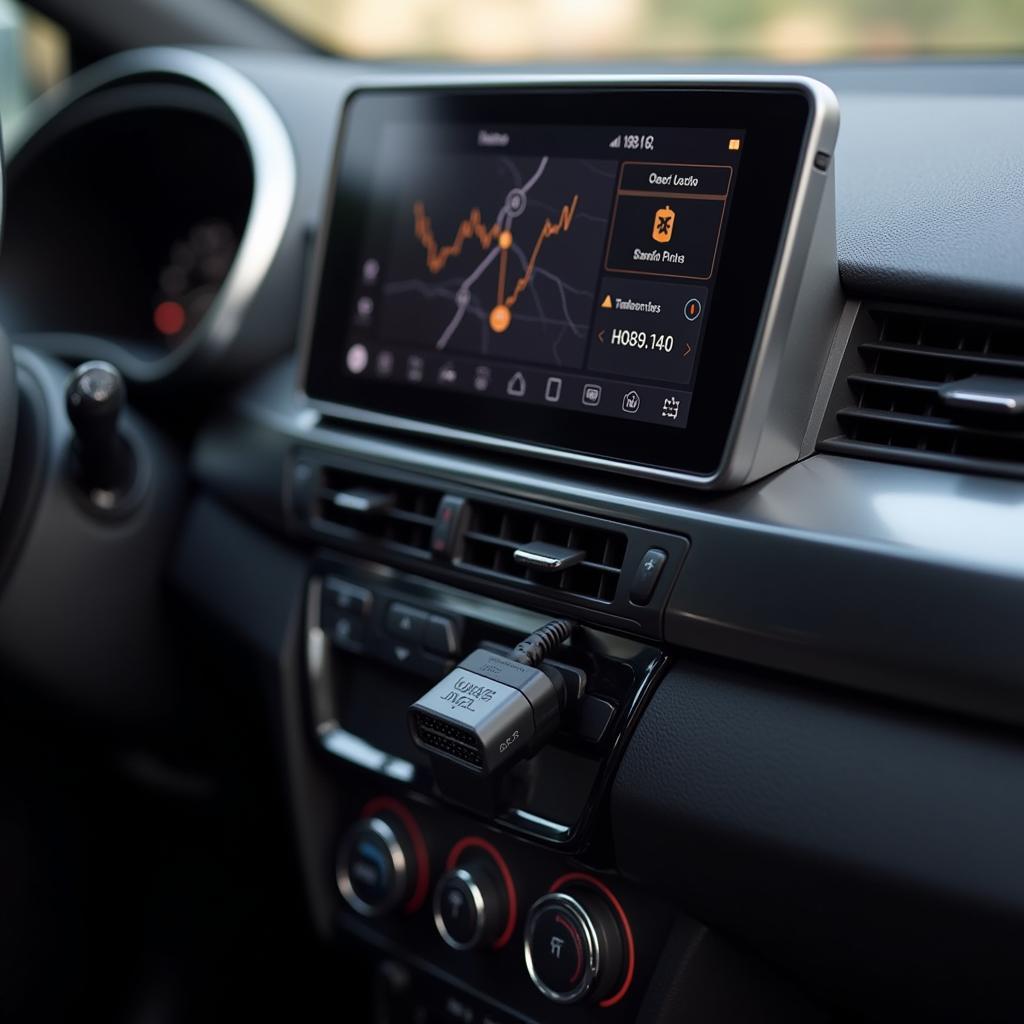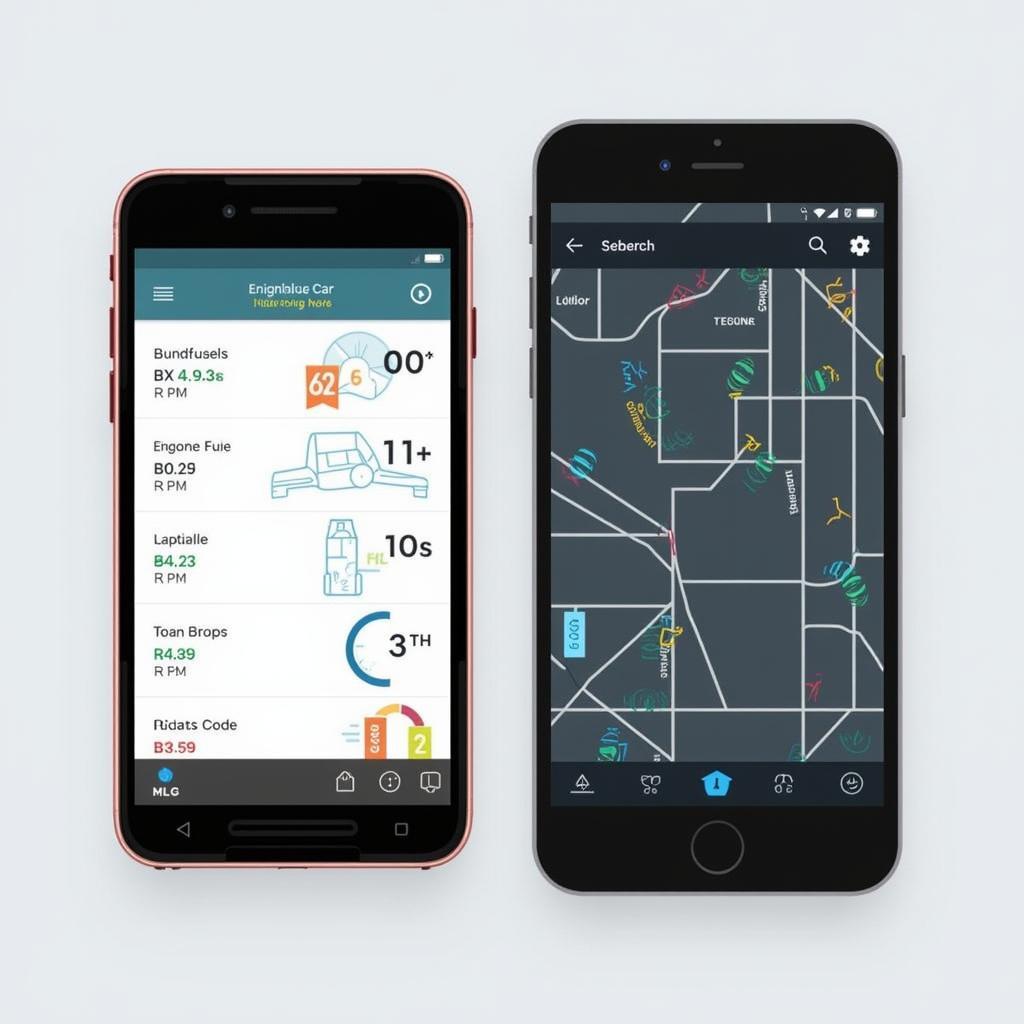The world of car diagnostics has evolved drastically, with technology like Diagnostic Plug Car Gps systems leading the charge. These advanced systems offer a comprehensive insight into your vehicle’s health, performance, and location, often surpassing the capabilities of traditional OBD2 scanners. This guide delves deep into the world of diagnostic plug car GPS systems, exploring their functionalities, benefits, and how they can revolutionize your driving experience.
What is a Diagnostic Plug Car GPS System?
A diagnostic plug car GPS system is a multifaceted device that combines the functionalities of a traditional OBD2 scanner with a GPS tracker. It plugs directly into your vehicle’s OBD2 port, typically located under the dashboard on the driver’s side. Once connected, it taps into the car’s onboard computer, retrieving real-time data on various parameters like:
- Engine Performance: RPM, speed, throttle position, coolant temperature, fuel consumption
- Emissions Data: Oxygen sensor readings, evaporative emissions system status
- Safety Systems: Airbag status, ABS performance, tire pressure monitoring
- Location Tracking: Real-time GPS location, trip history, geofencing capabilities
 Diagnostic Plug Car GPS System Connected to a Car’s OBD2 Port
Diagnostic Plug Car GPS System Connected to a Car’s OBD2 Port
Why Choose a Diagnostic Plug Car GPS System?
The advantages of using a diagnostic plug car GPS system are numerous and extend beyond the capabilities of a standalone OBD2 scanner or GPS tracker.
1. Enhanced Vehicle Diagnostics:
These systems provide an in-depth analysis of your car’s health, going beyond reading and clearing basic engine codes. They offer real-time data monitoring, allowing you to identify potential issues before they escalate into costly repairs.
2. Improved Security and Peace of Mind:
The integrated GPS tracker offers real-time location tracking, allowing you to monitor your vehicle’s whereabouts anytime, anywhere. Features like geofencing send alerts when the vehicle enters or exits pre-defined zones, offering an extra layer of security against theft.
3. Enhanced Driving Experience:
Many diagnostic plug car GPS systems double as trip computers, providing insightful data on fuel consumption, driving habits, and route optimization. This information can be valuable for improving fuel efficiency and adopting safer driving practices.
 Smartphone App Displaying Data from a Diagnostic Plug Car GPS System
Smartphone App Displaying Data from a Diagnostic Plug Car GPS System
Choosing the Right Diagnostic Plug Car GPS System
With a plethora of options available, choosing the right diagnostic plug car GPS system can seem daunting. Here’s what to consider:
1. Compatibility: Ensure the system is compatible with your car’s make, model, and year. Check the manufacturer’s website or consult their compatibility list.
2. Features: Determine the features most important to you. Do you prioritize real-time diagnostics, GPS tracking, or both? Some systems offer additional features like driver behavior monitoring or integration with third-party apps.
3. User Interface: Opt for a system with a user-friendly interface, whether it’s a standalone device with a built-in display or a system that connects to your smartphone via Bluetooth.
4. Data Logging and Reporting: If you intend to use the system for monitoring vehicle performance over time, choose one that offers data logging and reporting features. This allows you to track trends, identify recurring issues, and even share data with your mechanic.
Diagnostic Plug Car GPS vs. Traditional OBD2 Scanners
While both diagnostic plug car GPS systems and traditional OBD2 scanners offer valuable insights into a vehicle’s health, there are key distinctions:
-
Functionality: Diagnostic plug car GPS systems provide a wider range of functionalities, including GPS tracking, real-time data monitoring, and often, driver behavior analysis, which are absent in basic OBD2 scanners.
-
Connectivity: While most OBD2 scanners require a physical connection to the vehicle, many diagnostic plug car GPS systems offer remote access to data via smartphone apps, providing greater convenience and flexibility.
-
Cost: Generally, diagnostic plug car GPS systems tend to be more expensive than basic OBD2 scanners due to their advanced features and capabilities. However, the added functionalities and convenience often outweigh the initial cost difference.
The Future of Car Diagnostics
Diagnostic plug car GPS systems are at the forefront of a paradigm shift in how we interact with and understand our vehicles. As technology advances, we can expect even more sophisticated features and functionalities.
Imagine a system that:
- Predicts potential vehicle malfunctions based on real-time data analysis, enabling proactive maintenance and minimizing downtime.
- Integrates seamlessly with smart home systems, allowing you to pre-heat or cool your car remotely based on your schedule.
- Connects to a network of other vehicles and infrastructure, facilitating safer and more efficient driving through real-time traffic updates and hazard warnings.
The possibilities are endless, and diagnostic plug car GPS systems are paving the way for a future where cars are no longer just modes of transportation but intelligent companions on the road.
Conclusion
Diagnostic plug car GPS systems are revolutionizing the way we diagnose, track, and interact with our vehicles. They empower car owners with a deeper understanding of their vehicles, enhancing safety, improving performance, and offering invaluable peace of mind. As technology continues to evolve, these systems are poised to become indispensable tools for any car owner looking to stay ahead of the curve.
FAQs about Diagnostic Plug Car GPS Systems
1. Will a diagnostic plug car GPS system drain my car battery?
Most systems are designed for low power consumption and will not significantly drain your car battery. However, it’s always a good practice to unplug the device if you plan to leave your vehicle parked and unused for an extended period.
2. Can I install a diagnostic plug car GPS system myself?
Yes, installation is generally straightforward. Locate your car’s OBD2 port (usually under the dashboard on the driver’s side), plug in the device, and follow the manufacturer’s instructions for setup.
3. Do I need a subscription for the GPS tracking feature?
Most systems require a subscription for real-time GPS tracking and geofencing features. Subscription costs vary depending on the provider and the features included.
4. Can a diagnostic plug car GPS system interfere with my car’s electronics?
Reputable systems are designed to be compatible with modern vehicle electronics and should not cause any interference. However, it’s always advisable to purchase devices from reputable brands and follow the manufacturer’s instructions carefully.
5. Can I use a diagnostic plug car GPS system on any car?
Compatibility varies depending on the system and the car’s make, model, and year. Check the manufacturer’s compatibility list or contact their customer support to confirm compatibility before purchasing.
Need further assistance or have more questions? Our team of car diagnostic experts is always here to help. Reach out to us via WhatsApp: +1(641)206-8880, Email: [email protected]. We offer 24/7 customer support to assist you with any queries.

Leave a Reply